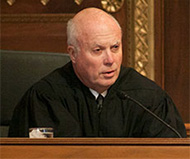Article from: www.thenewspaper.com/news/69/6983.asp
10/14/2020
Ohio Court of Appeals Again Rescues Speed Cameras
Ohio Court of Appeals decision reverses course to save speed cameras from a class action lawsuit in New Miami.
 The legal saga of New Miami's speed camera program took an unexpected turn Tuesday after the Ohio Court of Appeals rescued photo radar by reversing a lower court ruling. Aspects of the class action lawsuit brought seven years ago by motorists demanding refunds from the illegal use of speed cameras have even been upheld by the state Supreme Court, but the three-judge appellate panel stepped said high court precedent would not allow the refunding of $3,066,422 in tickets to drivers.
The legal saga of New Miami's speed camera program took an unexpected turn Tuesday after the Ohio Court of Appeals rescued photo radar by reversing a lower court ruling. Aspects of the class action lawsuit brought seven years ago by motorists demanding refunds from the illegal use of speed cameras have even been upheld by the state Supreme Court, but the three-judge appellate panel stepped said high court precedent would not allow the refunding of $3,066,422 in tickets to drivers.
"Though this case has been before this court three prior times, this is the first time that review of the merits of summary judgment has been properly before us," Judge Robert P. Ringland wrote for the appellate majority.
In 2016, Butler County Judge Michael A. Oster found that New Miami's automated ticketing ordinance failed to provide accused vehicle owners with due process (view ruling). Under New Miami's ordinance, the for-profit vendor Optotraffic provided hearsay evidence against motorists who had no realistic way of establishing their innocence. The appellate majority ruled that the due process provided by New Miami's program was good enough because it was similar to that provided by other cities that use photo radar.
"Initially, we note that there is no constitutional infirmity with the manner in which New Miami chose to impose liability, i.e., upon the vehicle owner or lessee unless they identify the responsible party," Judge Ringland wrote. "This is indeed a common feature of automated speed programs... The ordinance effectively provided the owner with a choice: accept liability for the third party's use of the vehicle or identify the responsible party. Such a system does not violate due process or upset traditional notions of fair play."
The majority also had no problem with the use of nothing but hearsay evidence in photo ticket cases because a potential $205 fine is "insubstantial" compared to the government's interest in running the program. Judge Robin N. Piper disagreed with his colleagues on that point.
"I write separately only to emphasize there are significant due process concerns involving the automated speed enforcement program as implemented by New Miami's ordinance," Judge Piper wrote. "It is disingenuous to say that government interest is predominant when it is a private enterprise that creates the system, manages the system, and then commercially reaps huge profits from a minimalistic civil process... The citizen is funneled into a process that financially coerces one into simply paying the fine. The potential cost in establishing one's innocence becomes such a burden emotionally, timewise, and financially, a reasonable person has no choice but to pay up."
A copy of the ruling is available in a 200k PDF file at the source link below.
Source: Barrow v. New Miami (Court of Appeals, State of Ohio, 10/13/2020)
Permanent Link for this item
Return to Front Page
 The legal saga of New Miami's speed camera program took an unexpected turn Tuesday after the Ohio Court of Appeals rescued photo radar by reversing a lower court ruling. Aspects of the class action lawsuit brought seven years ago by motorists demanding refunds from the illegal use of speed cameras have even been upheld by the state Supreme Court, but the three-judge appellate panel stepped said high court precedent would not allow the refunding of $3,066,422 in tickets to drivers.
The legal saga of New Miami's speed camera program took an unexpected turn Tuesday after the Ohio Court of Appeals rescued photo radar by reversing a lower court ruling. Aspects of the class action lawsuit brought seven years ago by motorists demanding refunds from the illegal use of speed cameras have even been upheld by the state Supreme Court, but the three-judge appellate panel stepped said high court precedent would not allow the refunding of $3,066,422 in tickets to drivers.